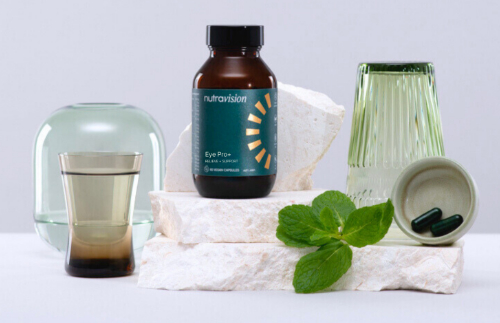
Have you heard of natural glaucoma treatment with nicotinamide or vitamin B3? Before we discuss nicotinamide and vitamin B3, let’s find out a bit more about glaucoma first.
What is glaucoma and why is it important?
Glaucoma is a condition where there is progressive damage to the optic nerve, usually related to high pressure in the eye. This causes visual field loss and if untreated, eventual blindness.
Glaucoma is the second commonest cause of blindness worldwide, and affects at least 2% of the population. More than 60 million people are affected globally. The scary thing is that most people do not notice any glaucoma symptoms until a lot of glaucoma damage has already occurred.
It is widely accepted that the retinal ganglion cells of the optic nerve become permanently and irreversibly damaged from glaucoma. It is this damage to the ganglion cells that eventually leads to blindness.
The conventional thinking is that any vision lost from the optic nerve damage cannot be recovered, hence the focus on monitoring and early glaucoma treatment. The idea to pick up early signs of glaucoma damage before any significant sight loss and glaucoma symptoms develop.
What is nicotinamide and is it different from vitamin B3?
Vitamin B3 is a water-soluble vitamin (there are 7 other water-soluble vitamins). Being water-soluble means that any excess vitamin is excreted through urine rather than being stored in the body.
Nicotinamide is the active form of vitamin B3. Other names for vitamin B3 include niacin, niacinamide, nicotinic amide, and nicotinic acid.
Vitamin B3 plays an important role in supporting cell metabolism, mitochondrial health, and DNA repair. It is naturally found in lean meat, milk, fish and nuts, and is commonly added to cereals and other foods.
Vitamin B3 nicotinamide supplements are widely available for purchase over-the-counter and have been recommended for maintaining skin health.
Nicotinamide is generally well tolerated in doses under 3,000 mg per day. This is unlike the nicotinic acid form of Vitamin B3, which can cause flushing and gastrointestinal upset.
Interesting fact: Although niacin and nicotinamide are both Vitamin B3 (and in fact niacin can be turned into nicotinamide in the body), their effects are not the same. This means that niacin and nicotinamide are not interchangeable as supplements.
How does natural glaucoma treatment with nicotinamide (vitamin B3) work?
In 2020, a world-first clinical trial conducted by the Centre for Eye Research Australia reported results confirming that nicotinamide could have a positive impact in protecting against nerve damage in glaucoma.
The most exciting finding is that in some people suffering from glaucoma, high dose nicotinamide (3,000 mg daily) significantly improved the function of the optic nerve ganglion cells (measured using electroretinography).
The specific nicotinamide brand used in the trial is Insolar.
A separate trial published in 2021 found that in treated moderate open angle glaucoma patients, an oral nicotinamide (1,000 to 3,000 mg) was able to significantly improve visual function when taken over 2 months.
No serious adverse effects were reported with the nicotinamide. Insolar was not used in this trial.
Remember the conventional thinking that any damage to the optic nerve is permanent and irreversible?
We now have well-conducted clinical trials demonstrating that it is possible to improve optic nerve function despite damage from glaucoma.
More research to follow on natural glaucoma treatment with nicotinamide (vitamin B3) and its longer term benefits
The original trial followed 57 glaucoma patients over a period of 12 weeks.
The number of patients studies is relatively small. The trial duration is also quite short (only 12 weeks), considering that glaucoma is a lifelong disease.
CERA is now conducting a large, international, multi-center trial to determine if the benefits of nicotinamide can be sustained over the long term.
The Vitamin B3 in Glaucoma Study (VIBGS) plans to follow-up more than 150 patients over a 2-year period.
What about the other B vitamins? Are they beneficial for glaucoma too?
The other B vitamin that has shown some promise for glaucoma is vitamin B12 (cobalamin). Vitamin B12 is important for DNA regulation, red blood cell production, and helps with the function of our nervous system.
Our body does not produce vitamin B12 naturally, and so we rely on food consumption for vitamin B12. Good food sources of vitamin B12 are eggs, milk, fish, and meat.

Vitamin B12 deficiency increases with age due to poor absorption by the body. It is associated with damage to the optic nerve (optic neuropathy), which can cause blindness if untreated.
Glaucoma is of course a type of optic neuropathy, and naturally there is interest in whether methylcobalamin (the activated and most highly absorbed form of vitamin B12) could potentially be beneficial for glaucoma.
The studies reporting on methylcobalamin and glaucoma have not been of particularly high quality. However, the most promising evidence comes from a Japanese study published in 2000.In this trial, low pressure glaucoma patients who took 1,500 micrograms (or 1.5 mg) oral methylcobalamin daily had significantly less visual field deterioration after 4 years when compared to the control group.
See Related: Natural glaucoma vitamins for your optic nerve
I have glaucoma. Should I take nicotinamide vitamin B3 anyway?
In my clinical practice, I have been recommending natural glaucoma treatment with nicotinamide vitamin B3 to some, but not all, of my glaucoma patients but at lower dosages.
This is because the high dose may not be easily tolerated by some, and my clinical opinion is that taking a lower dose of 500 mg daily over the long term may be better and more tolerable.
The specific brand used in the Australian trial was Insolar, which is manufactured by Blackmores. It is widely available in most health stores and through Amazon Australia.
If Insolar is not available for you, then any other nicotinamide vitamin B3 should be fine as long as you purchase from a reputable supplement manufacturer.
If you are considering natural glaucoma treatment with nicotinamide vitamin B3, and/or methylcobalamin, please make sure to discuss with your eye specialist and family doctor first to avoid adverse drug interactions and unwanted side effects.
These B vitamins must not replace the glaucoma treatment that has already been prescribed by your eye specialist. Rather, it should be taken in addition to and complementary to your existing treatment.
If you wish to supplement your glaucoma treatment with methylcobalamin to prevent and reduce your risk glaucoma blindness, below are highly-rated and recommended supplements that are available for you to purchase through Amazon:
Are there any other alternative natural remedies for glaucoma?
Yes! As a natural glaucoma treatment, nicotinamide vitamin B3 shows great promise. However, not everyone can tolerate nicotinamide and methylcobalamin.
There are other widely available natural supplements that can be used to complement your existing glaucoma treatment.
It is worth repeating that if you are considering any of the natural glaucoma supplements and remedies, please make sure to discuss with your eye specialist and family doctor first to avoid adverse drug interactions and unwanted side effects.
See Related:




